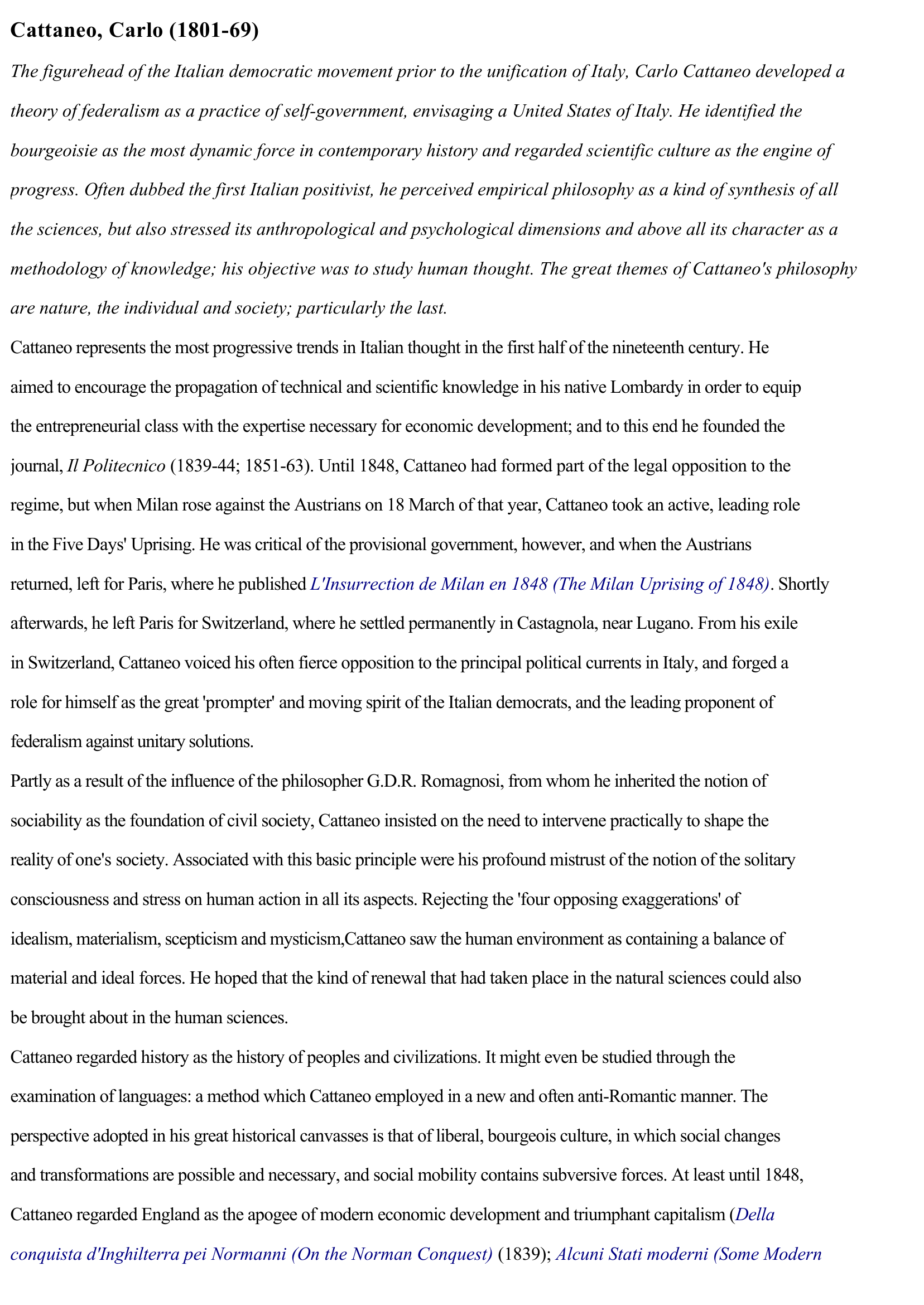Cattaneo, Carlo
Extrait du document
The figurehead of the Italian democratic movement prior to the unification of Italy, Carlo Cattaneo developed a theory of federalism as a practice of self-government, envisaging a United States of Italy. He identified the bourgeoisie as the most dynamic force in contemporary history and regarded scientific culture as the engine of progress. Often dubbed the first Italian positivist, he perceived empirical philosophy as a kind of synthesis of all the sciences, but also stressed its anthropological and psychological dimensions and above all its character as a methodology of knowledge; his objective was to study human thought. The great themes of Cattaneo's philosophy are nature, the individual and society; particularly the last. Cattaneo represents the most progressive trends in Italian thought in the first half of the nineteenth century. He aimed to encourage the propagation of technical and scientific knowledge in his native Lombardy in order to equip the entrepreneurial class with the expertise necessary for economic development; and to this end he founded the journal, Il Politecnico (1839-44; 1851-63). Until 1848, Cattaneo had formed part of the legal opposition to the regime, but when Milan rose against the Austrians on 18 March of that year, Cattaneo took an active, leading role in the Five Days' Uprising. He was critical of the provisional government, however, and when the Austrians returned, left for Paris, where he published L'Insurrection de Milan en 1848 (The Milan Uprising of 1848). Shortly afterwards, he left Paris for Switzerland, where he settled permanently in Castagnola, near Lugano. From his exile in Switzerland, Cattaneo voiced his often fierce opposition to the principal political currents in Italy, and forged a role for himself as the great 'prompter' and moving spirit of the Italian democrats, and the leading proponent of federalism against unitary solutions.
«
Cattaneo, Carlo (1801-69)
The figurehead of the Italian democratic movement prior to the unification of Italy, Carlo Cattaneo developed a
theory of federalism as a practice of self-government, envisaging a United States of Italy.
He identified the
bourgeoisie as the most dynamic force in contemporary history and regarded scientific culture as the engine of
progress.
Often dubbed the first Italian positivist, he perceived empirical philosophy as a kind of synthesis of all
the sciences, but also stressed its anthropological and psychological dimensions and above all its character as a
methodology of knowledge; his objective was to study human thought.
The great themes of Cattaneo's philosophy
are nature, the individual and society; particularly the last.
Cattaneo represents the most progressive trends in Italian thought in the first half of the nineteenth century.
He
aimed to encourage the propagation of technical and scientific knowledge in his native Lombardy in order to equip
the entrepreneurial class with the expertise necessary for economic development; and to this end he founded the
journal, Il Politecnico (1839-44; 1851-63).
Until 1848, Cattaneo had formed part of the legal opposition to the
regime, but when Milan rose against the Austrians on 18 March of that year, Cattaneo took an active, leading role
in the Five Days' Uprising.
He was critical of the provisional government, however, and when the Austrians
returned, left for Paris, where he published L'Insurrection de Milan en 1848 (The Milan Uprising of 1848).
Shortly
afterwards, he left Paris for Switzerland, where he settled permanently in Castagnola, near Lugano.
From his exile
in Switzerland, Cattaneo voiced his often fierce opposition to the principal political currents in Italy, and forged a
role for himself as the great 'prompter' and moving spirit of the Italian democrats, and the leading proponent of
federalism against unitary solutions.
Partly as a result of the influence of the philosopher G.D.R.
Romagnosi, from whom he inherited the notion of
sociability as the foundation of civil society, Cattaneo insisted on the need to intervene practically to shape the
reality of one's society.
Associated with this basic principle were his profound mistrust of the notion of the solitary
consciousness and stress on human action in all its aspects.
Rejecting the 'four opposing exaggerations' of
idealism, materialism, scepticism and mysticism,Cattaneo saw the human environment as containing a balance of
material and ideal forces.
He hoped that the kind of renewal that had taken place in the natural sciences could also
be brought about in the human sciences.
Cattaneo regarded history as the history of peoples and civilizations.
It might even be studied through the
examination of languages: a method which Cattaneo employed in a new and often anti-Romantic manner.
The
perspective adopted in his great historical canvasses is that of liberal, bourgeois culture, in which social changes
and transformations are possible and necessary, and social mobility contains subversive forces.
At least until 1848,
Cattaneo regarded England as the apogee of modern economic development and triumphant capitalism (Della
conquista d'Inghilterra pei Normanni (On the Norman Conquest) (1839); Alcuni Stati moderni (Some Modern.
»
↓↓↓ APERÇU DU DOCUMENT ↓↓↓

































